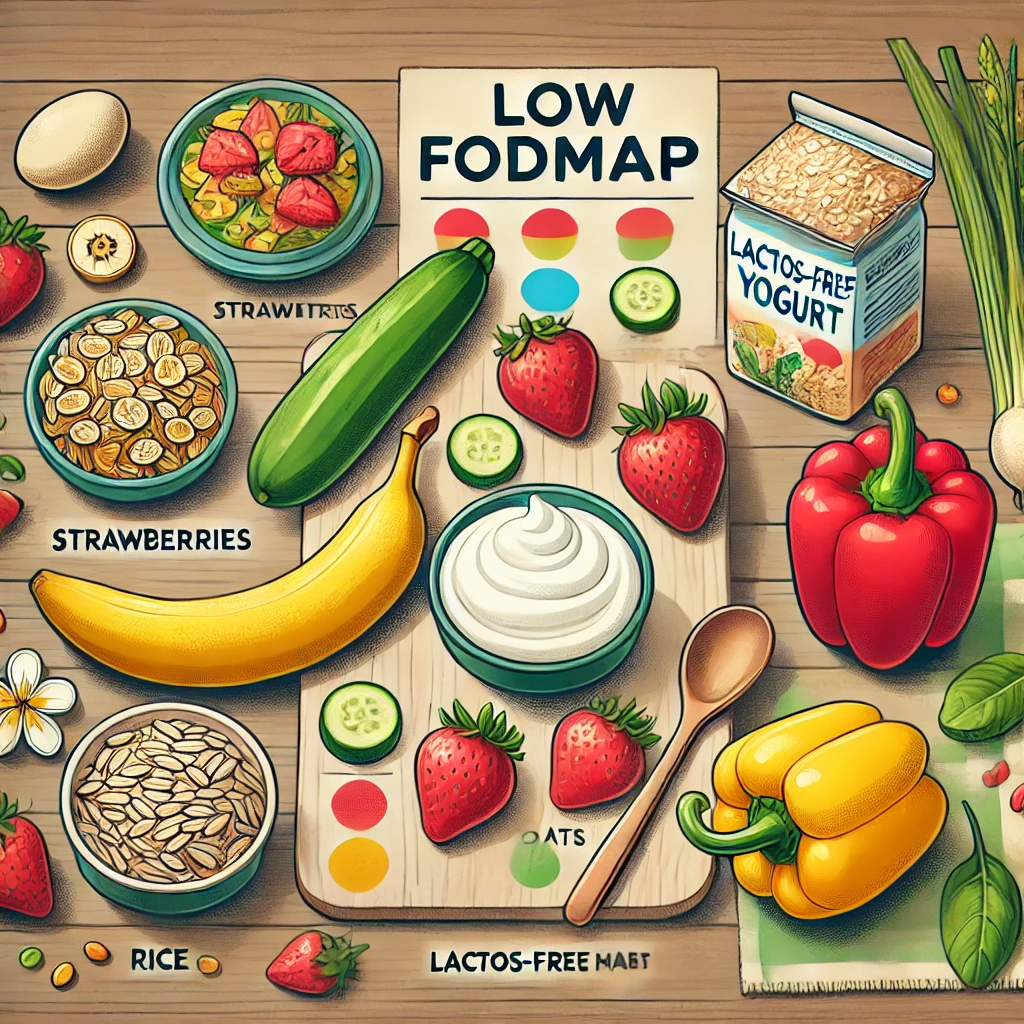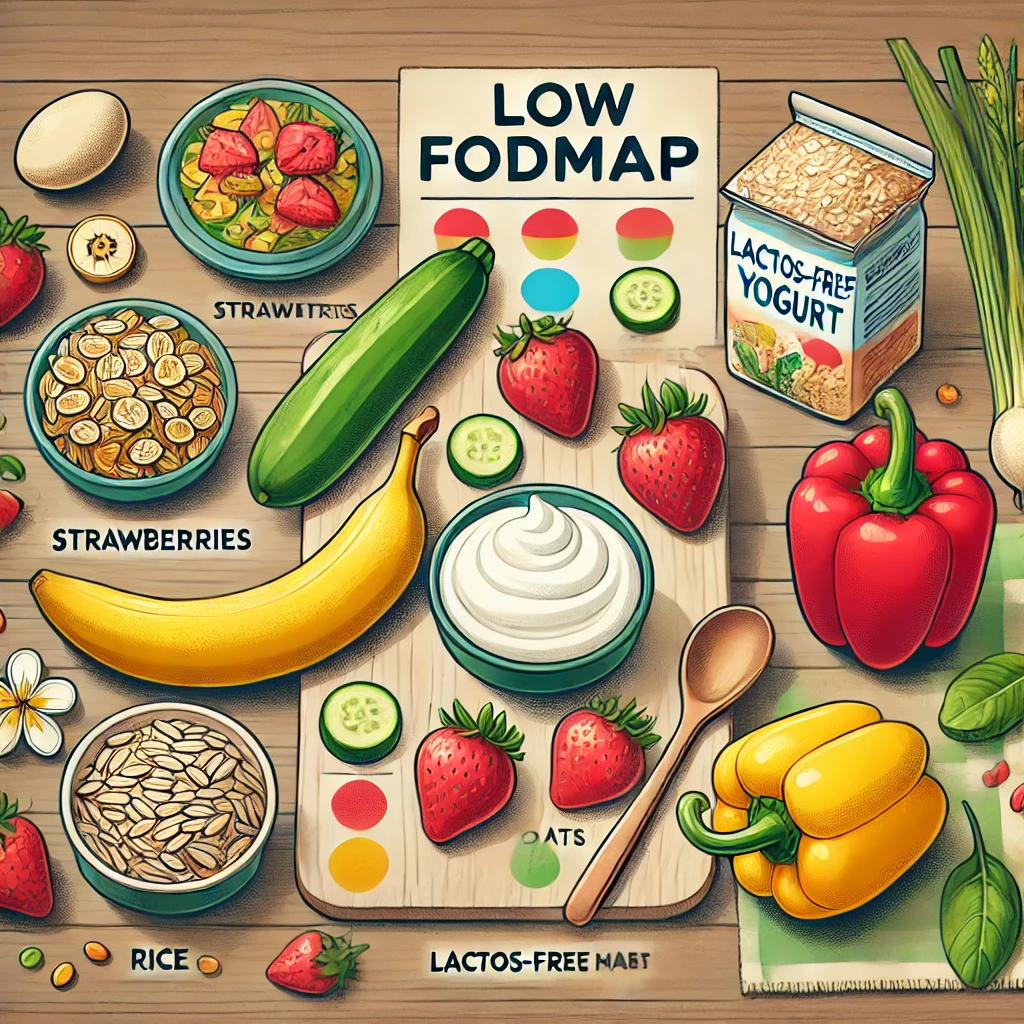
The low FODMAP diet is like a gentle friend that helps calm your upset stomach. If you’ve struggled with bloating, stomach pain, or digestive problems, this diet might be what you need.
- More than a trend, the low FODMAP diet is a popular solution for people with Irritable Bowel Syndrome (IBS) and other gut issues.
- Think of it as a toolkit for soothing your digestive system and helping you live without constant discomfort.
- This guide covers the basics, so whether you’re curious or ready to start, you’ll get the essential information.
- Spoiler: This diet isn’t forever! It’s a temporary way to identify what foods cause trouble for your stomach.
Let’s explore how this diet can help you take control of your digestive health.
Understanding FODMAPs and Their Impact
What is the FODMAP Diet?
The low FODMAP diet is a dietary approach designed to help individuals manage their digestive symptoms, particularly those associated with Irritable Bowel Syndrome (IBS).
FODMAPs are short-chain carbohydrates that some people find difficult to digest, leading to discomfort such as bloating, gas, and diarrhea. Here’s a breakdown:
- FODMAPs: Fermentable Oligosaccharides, Disaccharides, Monosaccharides, and Polyols.
- They draw extra water into your intestines, causing bloating, gas, and diarrhea.
- Eating high-FODMAP foods can make your digestive system uncomfortable, like a party you didn’t ask for.
The low-FODMAP diet, developed by researchers at Monash University in Australia, has improved symptoms in approximately 75% of IBS patients, supported by biological evidence and prospective trials. FODMAPs are poorly absorbed carbohydrates in the small intestine, leading to increased fermentation and the production of gases like hydrogen and methane, exacerbating symptoms such as bloating and abdominal pain.
Common foods high in FODMAPs include:
- Garlic and onions
- Fruits: Apples, pears
- Sweeteners: Polyols found in sugar-free products
- Wheat and dairy products
These foods can trigger symptoms, but you don’t have to memorize a long list. The goal is to control your symptoms and identify which foods your body can handle.
- Check labels in your pantry; high-FODMAP ingredients like garlic can be hidden in many foods.
- This diet isn’t about fearing food. It’s about being an intelligent detective, finding what works for your gut.
Starting Your Low FODMAP Journey: Foods to Eat and Avoid

Now that you know why FODMAPs can upset your gut, let’s focus on what to eat.
- Meat, fish, and eggs: These are safe, but watch out for processed meats with additives.
- Low-FODMAP fruits and veggies: Ripe bananas, strawberries, zucchini, bell peppers, and potatoes.
- Grains: Rice and oats are good staples for most meals.
- Snacks: Popcorn, certain nuts, and lactose-free yogurt.
You don’t have to give up all your favorite foods. There are still plenty of tasty options!
- Label reading: Become familiar with spotting high-FODMAP ingredients in unexpected places.
- Experiment with low-FODMAP recipes: Try cooking at home to make delicious meals that suit your new diet.
Starting the low FODMAP diet involves two key phases:
- Elimination phase:
- Cut out high-FODMAP foods for a few weeks.
- This gives your digestive system a break and helps reset it.
- Reintroduction phase:
- Slowly add foods back into your diet one at a time.
- Observe which foods your gut can tolerate and which ones cause problems.
It may sound not easy, but with the right mindset, it’s doable. Plus, there are plenty of low-FODMAP recipes to keep things interesting:
- Try zesty grilled chicken and stir-fried veggies, or experiment with spices like rosemary and ginger.
- These recipes can be both flavorful and gut-friendly.
Real Stories of Success
Many people who stick to the low FODMAP diet report:
- Less bloating
- Reduced stomach pain
- Improved overall gut health
Success stories can be motivating! Seeing others thrive on this diet can encourage you to keep going.
- Track your progress: Keep a food diary to see how different foods affect your gut.
- This makes the diet more manageable and helps you identify patterns.
Beyond the Diet: Maintaining Digestive Health
Once you’ve identified your food triggers, it’s time to think long-term. Managing IBS and gut health isn’t just about food. Other lifestyle factors are important, too:
- Probiotics: These may help maintain gut health. Talk to your doctor or dietitian to see if they fit your plan.
- Stress, exercise, and sleep: These all impact your digestive system. Stress and lack of sleep can trigger symptoms, even if you’re following the diet.
- Find ways to relax, whether it’s through meditation, exercise, or other activities.
Get Professional Support
A dietitian can be a valuable resource:
- They’ll help you customize the diet to meet your nutritional needs while avoiding trigger foods.
- They can offer advice on whether you’re starting the diet or making adjustments.
Creating a Sustainable Approach
The ultimate goal is to build a lifestyle that supports gut health without being restrictive.
- Over time, you’ll develop a routine that allows you to enjoy a variety of foods.
- This approach will help you maintain comfort and balance in your digestive system.
Takeaways:
- The low FODMAP diet can help manage IBS and other digestive issues.
- It’s not a permanent change but a way to identify which foods cause problems for you.
- Follow the elimination and reintroduction phases to figure out your triggers.
- Along the way, get creative with recipes, stay patient, and seek professional guidance when needed.
- Over time, you’ll find a balance that lets you enjoy food without discomfort.
Conclusion
A low-FODMAP diet can effectively manage IBS and enhance digestive health. It’s not just about restriction; it’s about understanding your body’s needs. Start your path to digestive peace today—experiment with low-FODMAP recipes, track your progress, and take control of your gut health!
For more in-depth insights, check out this helpful book on Amazon: The Complete Low-FODMAP Diet.


Hi there. A very insightful read. Thank you for sharing your journey and I am sure there are so many people out there experiencing what you have. Quite incredible that EVERYTHING starts in the gut and how important gut health is in the optimum functioning of our minds and bodies. Your site is informative. Keep the content coming….
Hi Kristen
Thank you so much for your thoughtful comment! I’m happy you found the post insightful. It’s incredible how much of an impact gut health has on our overall physical and mental well-being. The Low FODMAP diet has been such a helpful tool for many in managing gut issues, and I’m excited to keep sharing more content like this. I appreciate your support and feedback—stay tuned for more tips and insights on gut health